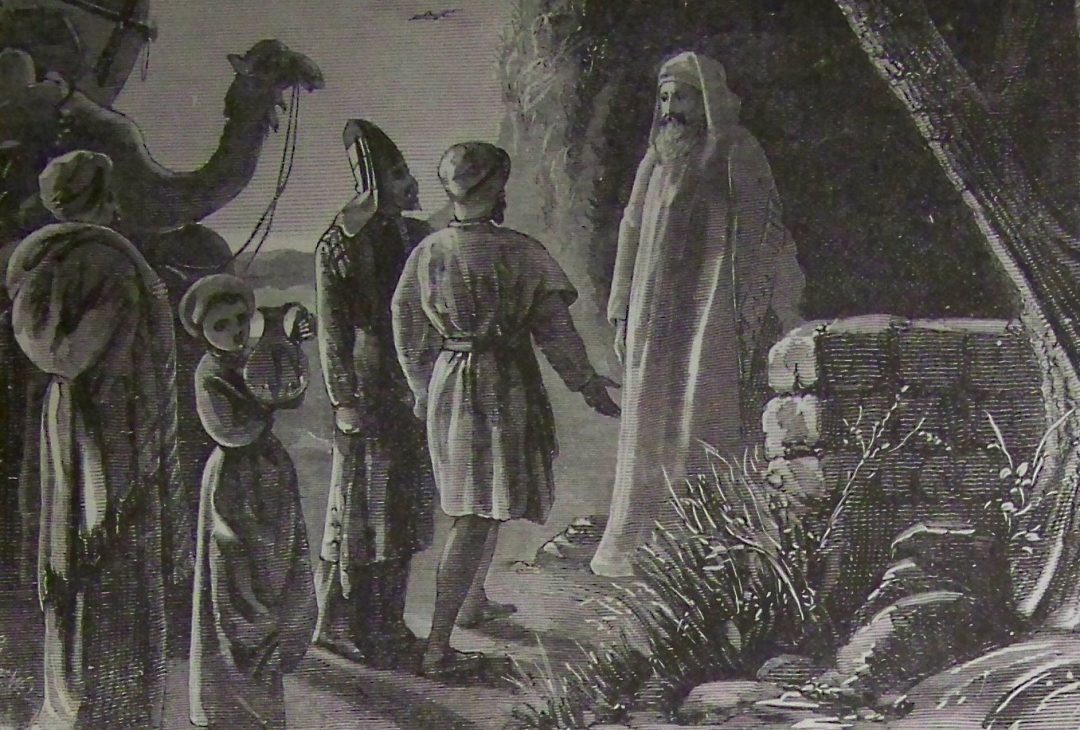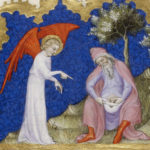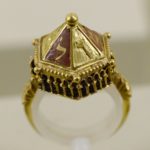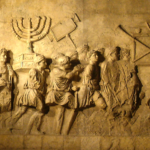Comic, But Not Funny: The One Comic Portion in the Chumash
Comedy? In the Chumash? Somehow, we do not think of comedy when we think of Chumash or of the Tanach for that matter. No, the Bible is a serious piece of work. Yet there is indeed a comic portion in what is undoubtedly a very serious narrative. The scene I have in mind is the tale of Bil’am and his donkey (Bamidbar 22:21-33). Watch now as the lights in the hall slow fade and the light illuminate the Biblical stage.
(21) Bil’am rose very early in the morning. He saddled his donkey. He left with the noblemen of Mo’av. (22) The Lord became angry with Bil’am because he went [with these men, so] He stood an angel of God in the road to bedevil him, while he (Bil’am) rides on his donkey and two lads are [walking along] with him.
Bil’am is the famous prophet, whose spiritual powers are known far and wide. Otherwise, why would Balak have sent for him? Balak is nobody’s fool. He witnessed the way the Jews defeated Sichon and Og. He quickly realized that this enormous mass of people would slice through his country like a knife through goat cheese. If he could not defeat the Jews militarily, then how? The answer was Bil’am. Bil’am would curse the Jews. He would mortally wound them spiritually. Everyone knew the great prophet and manipulator of the spirit world known as Bil’am. And now the spiritual wonder worker was on his way to Balak.
It was a beautiful day for a ride on a donkey. Donkey riding affords a good look at the passing landscapes. However, the great Seer did not see what stood in front of him just down the road. But the donkey did.
(23) The donkey saw the angel of God standing in the road with his sword drawn in his hand. [So,] the donkey turned off the road and headed out into field, [while] Bil’am hit the donkey to try to get her back on the road.
Here is our first comic moment.
Hadn’t the donkey ever seen a soldier with his sword drawn? Certainly, Bil’am, the spiritual advisor to kings must have ridden his donkey past many a guard post filled with soldiers brandishing swords! But the donkey knew exactly what he saw and this was no ordinary soldier, this was an angel and he looked very fierce and dangerous. So, just picture Bil’am’s surprise when his donkey leaves the smooth road for the bumpy field.
We must interject two important elements here that are not necessarily part of the readers’ experience. When is the last time you took a trip riding on the back of a donkey? The first is that donkeys are indeed stubborn. The second is that they are not graceful when they run. To watch a horse run is to see a thing of beauty in motion. When a donkey runs, it sort of scuttles along. Thus, the picture you are to conjure up in your mind is a rather comical one: There goes the donkey scuttling and bouncing along at top speed through an open field with Bil’am holding on for dear life, trying to keep his hat on his head while swatting the donkey with his cane, screaming, “Back to the road you imbecilic animal!” But the donkey doesn’t listen. Instead, she (it is a she-donkey) heads off down the narrow path in between the vineyards.
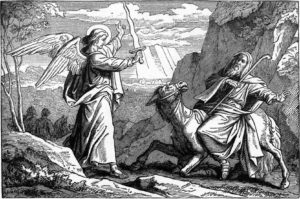 (24) The angel of God stood [now] in the narrow path [between] the vineyards, with a fence on this side and a fence on this side. (25) [For the second time,] the donkey saw the angel of God. She pushed up against the wall and squashed Bil’am’s leg against the wall. [So,] he hit her again.
(24) The angel of God stood [now] in the narrow path [between] the vineyards, with a fence on this side and a fence on this side. (25) [For the second time,] the donkey saw the angel of God. She pushed up against the wall and squashed Bil’am’s leg against the wall. [So,] he hit her again.
When the Chumash talks of a fence you cannot think of a wood fence. Wood was a precious commodity, too valuable to use for a fence. Rather, a fence means a stone wall. Even today, there is an overabundance of rocks and stones just lying around in the Holy Land.
The path is narrow but not too narrow. The donkey sees a way of slipping past the ominous vision of an angel, if only she can push up against the stone fence And this provides a second comic moment. You and I see the angel. The donkey sees the angel. Only the prophet Bil’am is blind to the angel’s presence. Thus, when the donkey pushes up against the rough stone fence, squashing Bil’am’s leg and scraping it along the sharp edged stones, he explodes with anger, once again screaming and yelling at the donkey, hitting her again and again as she resumes running down the middle of the path.
(26) The angel of God moved again. He stood [now] in a very narrow place where there is no room to move right or left. (27) [For the third time,] the donkey saw the angel of God and collapsed under Bil’am. Bil’am was very angry and he hit the donkey with his stick.
One minute he is riding on his donkey, with his feet dangling in the air and the next thing he knows he is standing in the road with a donkey sprawled between his feet. Now, he is really angry. We, on the other hand, are enjoying a third comic moment.
Now it is time for the miracle. Not just any miracle, but one so great that the Talmudic rabbis claim that it was one of the wondrous things God created during those last fleeting moments of the sixth day of Creation.
(28) God opened the donkey’s mouth. She said to Bil’am, “What have I done to you that you have hit me these three times?”
Every word here is just dripping with irony. The donkey assumes that his prophetic master has seen the dangerous angel all along. That is why the donkey cannot understand why Bil’am is beating her with his cane instead of thanking her for saving him. Notice that the donkey does not ask Bil’am, “Didn’t you see the angel?” because she assumes that of course, he saw the angel!
(29) Bil’am said to the donkey, “You have been playing games with me! If I only had a sword in my hand, I would have killed you!”
Bil’am still does not see the angel, who is probably standing by with his sword resting on his outstretched palms, saying, “Wanna borrow mine?”
Bil’am is so upset that it does not register that he is actually having an argument with an animal, with a donkey. Considering who Bil’am is and what he does for a living, namely talk with God, this, too, is a most comic moment.
(30) The donkey said to Bil’am, “Am I not your donkey that you have ridden from when you were born until today? Have I ever done such a thing to you before?” He (Bil’am) answers [quietly and a bit humbly,] “No.”
What else can the donkey say? She still thinks that Bil’am saw the angel. At least she has calmed him down. Now God intervenes once again.
(31) God opened Bil’am’s eyes. He saw the angel of God standing in the road with his drawn sword in his hand. He (Bil’am) kneeled and prostrated himself on his face [before the angel].
Bil’ aturns his face upward to look at the fierce sword-wielding angel and silently prays that he will not suddenly lose his head, literally!
(32) The angel of God said to him, “Why have you hit your donkey these three times? Indeed, I came out to bedevil [you], for the road in opposition to Me [says God] is a crooked (i.e., corrupt) one.”
The angel pauses here. He is waiting for Bil’am to admit that he did not see him. But Bil’ am just kneeled there shuddering with his face half on the ground and half-turned upward to the angel.
(33) “The donkey saw me says the angel with a sneer of disdain and turned away from me these three times. Maybe she turned away from me because I was now going to kill you and let her live?”
Bil’am finally learns that the donkey was simply trying to save his life. And much to his chagrin, he now understands that the donkey spiritual sensitivity is much keener than his. The donkey saw the angel and he did not.
Dripping with irony, filled with comic moments, this scene is unforgettable, for the great seer and prophet is humbled and stripped bare of his arrogance and self-importance on a narrow country lane. This is the one truly comic scene in the Bible. It would be funny if it were not so deadly serious.
Bil’am’s Nemesis
In every respect, the story of Bil’am and Balak is remarkable. Since the beginning of Sefer Shemot, this is the only narrative that does not involve a single Jew. Here is an entire story, spread over three complete chapters, 96 verses, without Jewish actors on the stage. The text is unusual because there are no Parashah separations throughout the story. It is one long, single unit. The characters are well drawn; there is a clear plot with tension between the characters. There is also some of the most beautiful Hebrew poetry in the Bible. And don’t forget the comedy. Yet it is only when we delve deeper into the text that we begin to understand the true danger that Bil’am posed to the Jewish people in the desert.
 In between the lines of the comic scene involving Bil’am, his donkey and the angel sent by God, there are numerous allusions to a very different narrative. There are distinct parallels between the Bil’am story and the Akedat Yitzchak. Here they are in order:
In between the lines of the comic scene involving Bil’am, his donkey and the angel sent by God, there are numerous allusions to a very different narrative. There are distinct parallels between the Bil’am story and the Akedat Yitzchak. Here they are in order:
In verse 21 Just as Avraham got out of bed very early on the morning of the Akedah, so, Bil’am got up very early in the morning.
The Midrash comments that Avraham’s love for God ruined his dignity, for Avraham saddled his own donkey by himself instead of instructing a servant to do it for him. Bil’am’s hatred for the Jews destroyed his dignity, for he, too, saddled his own donkey.
In verse 22 Bil’am set off with two lads in tow, just as Avraham did.
Up until the angel is dispatched, the name used for God is Elohim, meaning the God of law and discipline. The Akedah also starts with Elohim appearing to Avraham. When the angel stops Avraham from even touching Yitzchak, he is an angel of God, HaShem, the God of love and Chesed. The angel that is sent to stop Bil’am is also an angel of HaShem, the God of love and Chesed.
In both stories animals play significant roles, even though the ram does not talk.
Verses 23 28 Avraham traveled for three days before he arrived at the appointed spot. Bil’am traveled in three spurts, through three different paths until the angel actually stopped him.
Avraham brought the knife to the Akedah, but here Bil’am only wishes he had a sword. He just did not know that the angel did bring one along!
While Avraham is not allowed to harm Yitzchak at all, Bil’am gives his donkey a good beating three times.
This brings us to very peculiar phrase that also provides an interesting connection to the Akedat Yitzchak. In three instances, in three different verses (28, 32 & 33), the phrase, “three times,” appears. We would expect the Hebrew would read, “Shalosh Pe’amim,” but here it says, “Shalosh Regalim.” This very phrase is used in Sefer Shemot (23:14) as a reference to the three festivals of Pesach, Shavu’ot and Sukkot.
Interestingly enough, there is an allusion to these three festivals in the Akedah text. Berayshit 22:14 reads: “Avraham named the place, God will see HaShem Yir’eh,’ although it is called today, on God’s mountain he shall be seen BeHar HaShem Yayra’eh.’ ” Three times in Chumash (Shemot 23:17, 34:23 & Devarim 16:16), the phrase, “Three times a year, all your males shall be seen Yayra’eh – in the presence of God, your Lord.” Avraham says that on this mountain, which later becomes the home of the Bayt HaMikdash, “God will see.” And the Torah’s comment is that on this mountain of God, he, the Jewish male, “shall be seen” by God three times a year, on the Shalosh Regalim.
The question is: Why are there all of these textual connections between the tale of Bil’am and the Akedat Yitzchak?
The answer is that Avraham is Bil’am’s nemesis. We would assume that Bil’am rival for God’s affections would be Moshe, the leader of the Jews at that time. However, the Torah thinks otherwise. Bil’am certainly thought he had a chance to succeed in his mission to curse the Jews. What Bil’am did not realize was that the game was up before it even started. Bil’am was butting his head against a solid brick wall known as Avraham Avinu and Zechut Ha’Akedah, the merit of the Akedat Yitzchak.
In following God’s command and binding his son on an altar in preparation to sacrificing him, Avraham was setting into motion a spiritual process that still continues to reverberate and function in this world. The merit of the Akedah means that when the Jews are in trouble, God will come to their rescue by rising from the throne of law and discipline (Din) only to sit on the throne of mercy, compassion and sensitivity (Rachamim).
The spiritual battle began when Bil’am rose very early in the morning. However, for every thrust of his spiritual sword, Avraham had already prepared an effective parry.
To ride along in congruence with God’s will makes one spiritually sensitive. Avraham sees the spiritual sign that marks the place where the Akedah is to take place: “He saw the place from afar” (Berayshit 22:4). To follow a path that is against God’s will leads to spiritual blindness. Bil’am fails to see what his donkey sees, the angel of God. Yes, God gave Bil’am permission to go, but then God is angry that he went. It is certainly not unusual for a parent to tell a child, “Yes, you can go to such and such a place,” but both the parent and the child know that in the parent’s tone of voice there is an unspoken second half to that sentence, “but I prefer that you don’t go!” Bil’am is the naughty child who ignores the second half of the sentence.
In the end, the Torah hints to us that Avraham has already won this spiritual sword fight. The Akedah ends with an allusion to the on-going celebration of the three major festivals on the very spot where Avraham almost sacrificed his son. And three times, the donkey and the angel use the phrase Shalosh Regalim, hinting to Bil’am that the Jews will survive his attempt to curse them. While he will disappear from the Biblical stage and history, they will live on forever to celebrate Pesach, Shavu’ot, and Sukkot, the Shalosh Regalim.

